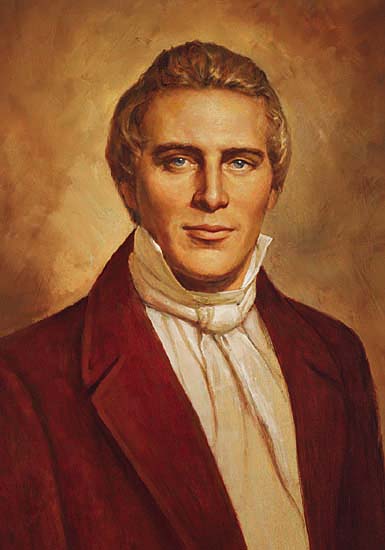Often, I have quoted the Mormon Prophet Joseph Smith when he declared: “Happiness is the object and design of our existence; and will be the end thereof, if we pursue the path that leads to it; and this path is virtue, uprightness, faithfulness, holiness, and keeping all the commandments of God” (Teachings of the Prophet Joseph Smith, pp. 255–56.)
 How to be happy seems pretty clear, then. As long as we are on the path that he describes, we’ll be happy. But how do we get on that path? How do we stay on it? President Thomas S. Monson, then a member of the First Presidency of The Church of Jesus Christ of Latter Day Saints, described in his article entitled “Happiness—The Universal Quest” (Ensign, Oct 1993, 2,) the ways that we can get on the path and stay there.
How to be happy seems pretty clear, then. As long as we are on the path that he describes, we’ll be happy. But how do we get on that path? How do we stay on it? President Thomas S. Monson, then a member of the First Presidency of The Church of Jesus Christ of Latter Day Saints, described in his article entitled “Happiness—The Universal Quest” (Ensign, Oct 1993, 2,) the ways that we can get on the path and stay there.
First, the path of virtue. The dictionary proffers the definition of virtue as “conformity to a standard of right: … a particular moral excellence,” the beneficial qualities of “strength or courage”—even “valor.”
Temptation comes to all of us, there are none who can escape its reach. However, we are not left defenseless in the face of such trials of character or moral courage. The Apostle Paul assured us that “There hath no temptation taken you but such as is common to man: but God is faithful, who will not suffer you to be tempted above that ye are able; but will with the temptation also make a way to escape, that ye may be able to bear it” (1 Cor 10:13.)
President Monson said that our conscience warns us as a friend before it punishes us as a judge. And I love that because all of us have that little voice in the back of our mind that whispers to us about the choices we are making—most of us can accurately distinguish between right and wrong, it’s just whether we choose to listen to that voice of reason or not that determines how we might act. We must “Learn that he who doeth the works of righteousness shall receive his reward, even peace in this world, and eternal life in the world to come”(D&C 59:23.)
Second, the path of uprightness. Few of us live perfectly upright lives. Perhaps none before or after Job have truly attained this righteous goal. However, Job didn’t live a perfect life—far from it. His life was beset with trials worthy of the most unlucky soul on earth. Yet, his moral compass never faltered and he never gave in to the temptation to just give up.
Dr. Karl Menninger, stated that the only way our suffering, struggling, anxious society can hope to prevent its moral ills is by recognizing the reality of sin. That’s the theme of his famed publication, Whatever Became of Sin? a plea to mankind to stop and look at what we are doing to ourselves, to each other and to our universe. Dr. Menninger referred to Socrates, who wondered, “How is it that men know what is good, but do what is bad?” Said Dr. Menninger, “I have come to the conclusion that the ‘Everyone is doing it’ morality which characterizes our public-business world is crippling people. We must believe in our personal responsibility to correct our individual transgressions—the white lies, the petty cheating, the apathy, which characterize our passive existence.” He further stressed, “If the concept of personal responsibility and answerability for ourselves and for others were to return to common acceptance and man once again would feel guilt for sins and repent and establish a conscience that would act as a deterrent for further sin, then hope would return to the world” (See Karl Menninger, Whatever Became of Sin? (New York: Hawthorn Books, Inc., 1973.)
Third, the path of faithfulness. This path connotes allegiance, loyalty, and adherence to promises. Faithfulness does not take holidays or days off. We can’t be faithful one minute but not the next. It is constant by its very definition.
The key to faithfulness is to have your goal in mind and to never waver. N. Eldon Tanner declared: “I would rather walk barefoot from here to the celestial kingdom … than to let the things of this world keep me out” (In Conference Report, Sept.–Oct. 1966, pp. 98–99.)
I often quote Captain Nesmith from the movie Galaxy Quest, “Never give up—never surrender.” And so too, must we never give up our quest for true happiness, nor surrender our virtue and moral values to get there.
Fourth, the path of holiness. Our Lord and Savior, Jesus Christ entreated all of us to follow His righteous example, to live as He lived. He spared no needy person His time or His compassion. He gave of his help however and whenever he could. And He wanted us to do the same.
If we walk in His footsteps, this will lead us to on a holy path, which path leads to happiness in this life and joy beyond imagining in the life to come. Few of us will attain the sort of holiness we associate with the Savior, but what a glorious life it would be if we only tried.
Fifth, keep all the commandments of God. “He that hath my commandments, and keepeth them, he it is that loveth me: and he that loveth me shall be loved of my Father, and I will love him, and will manifest myself to him” (John 14:21.)
I testify that as long we keep our sights set on our eternal goal and strive to keep our feet soundly on the path that leads us home, we will experience happiness, even joy, every day of our lives. This is the life God intended for us to have. He wants us to be happy. Let’s not disappoint Him.





